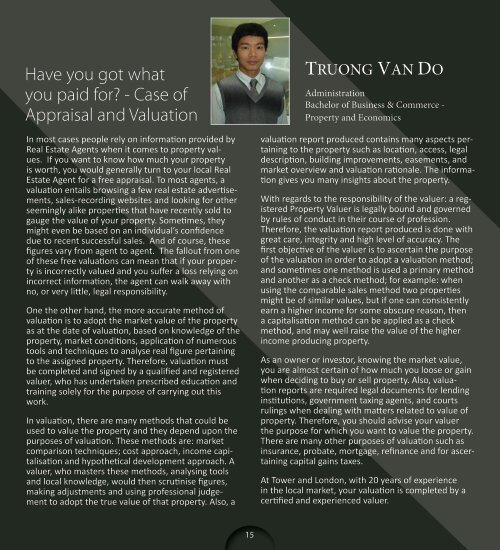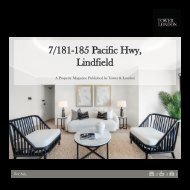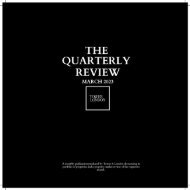You also want an ePaper? Increase the reach of your titles
YUMPU automatically turns print PDFs into web optimized ePapers that Google loves.
Have you got what<br />
you paid for? - Case of<br />
Appraisal and Valuation<br />
In most cases people rely on information provided by<br />
Real Estate Agents when it comes to property values.<br />
If you want to know how much your property<br />
is worth, you would generally turn to your local Real<br />
Estate Agent for a free appraisal. To most agents, a<br />
valuation entails browsing a few real estate advertisements,<br />
sales-recording websites and looking for other<br />
seemingly alike properties that have recently sold to<br />
gauge the value of your property. Sometimes, they<br />
might even be based on an individual’s confidence<br />
due to recent successful sales. And of course, these<br />
figures vary from agent to agent. The fallout from one<br />
of these free valuations can mean that if your property<br />
is incorrectly valued and you suffer a loss relying on<br />
incorrect information, the agent can walk away with<br />
no, or very little, legal responsibility.<br />
One the other hand, the more accurate method of<br />
valuation is to adopt the market value of the property<br />
as at the date of valuation, based on knowledge of the<br />
property, market conditions, application of numerous<br />
tools and techniques to analyse real figure pertaining<br />
to the assigned property. Therefore, valuation must<br />
be completed and signed by a qualified and registered<br />
valuer, who has undertaken prescribed education and<br />
training solely for the purpose of carrying out this<br />
work.<br />
In valuation, there are many methods that could be<br />
used to value the property and they depend upon the<br />
purposes of valuation. These methods are: market<br />
comparison techniques; cost approach, income capitalisation<br />
and hypothetical development approach. A<br />
valuer, who masters these methods, analysing tools<br />
and local knowledge, would then scrutinise figures,<br />
making adjustments and using professional judgement<br />
to adopt the true value of that property. Also, a<br />
TRUONG VAN DO<br />
Administration<br />
Bachelor of Business & Commerce -<br />
Property and Economics<br />
valuation report produced contains many aspects pertaining<br />
to the property such as location, access, legal<br />
description, building improvements, easements, and<br />
market overview and valuation rationale. The information<br />
gives you many insights about the property.<br />
With regards to the responsibility of the valuer: a registered<br />
Property Valuer is legally bound and governed<br />
by rules of conduct in their course of profession.<br />
Therefore, the valuation report produced is done with<br />
great care, integrity and high level of accuracy. The<br />
first objective of the valuer is to ascertain the purpose<br />
of the valuation in order to adopt a valuation method;<br />
and sometimes one method is used a primary method<br />
and another as a check method; for example: when<br />
using the comparable sales method two properties<br />
might be of similar values, but if one can consistently<br />
earn a higher income for some obscure reason, then<br />
a capitalisation method can be applied as a check<br />
method, and may well raise the value of the higher<br />
income producing property.<br />
As an owner or investor, knowing the market value,<br />
you are almost certain of how much you loose or gain<br />
when deciding to buy or sell property. Also, valuation<br />
reports are required legal documents for lending<br />
institutions, government taxing agents, and courts<br />
rulings when dealing with matters related to value of<br />
property. Therefore, you should advise your valuer<br />
the purpose for which you want to value the property.<br />
There are many other purposes of valuation such as<br />
insurance, probate, mortgage, refinance and for ascertaining<br />
capital gains taxes.<br />
At Tower and London, with 20 years of experience<br />
in the local market, your valuation is completed by a<br />
certified and experienced valuer.<br />
Water Charges For Your Property<br />
The subject of water charges is often a tricky<br />
subject when dealing with rental properties. As a<br />
landlord, you will generally pass on any usage bills<br />
to the tenant to pay for the utility which they have<br />
consumed. However when it comes to passing on<br />
water charges, the answer is not so black and white.<br />
In January 2011, the NSW government implemented<br />
new legislation regarding to tenancy. Included in this<br />
was information relating to passing on water charges.<br />
Under the new legislation, a landlord can only pass<br />
on water charges if the following criteria are met:<br />
- the rental premises must be individually<br />
metered<br />
- the charges must not exceed the amount<br />
billed for water usage by the water supplier<br />
- the rental premises must meet required<br />
water efficiency standards<br />
In order to meet required water efficiency standards,<br />
internal taps and showerheads must have a<br />
maximum flow rate of 9 litres per minute.<br />
JESSICA BRINCAT<br />
Administration<br />
BA (Media & Communications)<br />
When purchasing water efficient fittings for your<br />
property, please take note and look for items<br />
labeled with the WELS (Water Efficiency Labelling<br />
and Standards) rating. This will ensure you have a<br />
certified product and will ensure that you are able<br />
to pass on water charges. In order to ensure that<br />
you can pass on your water charges, Sydney Water<br />
advises that you keep a record of any receipts of<br />
invoices for items bought, work done, or even<br />
manuals and warranties to serve as proof of your<br />
compliance with the legislation.<br />
In areas such as Milsons Point, North Sydney and<br />
Kirribilli, areas which are heavily populated with units<br />
and apartment buildings, the above legislation will<br />
only apply to a select amount of properties. If you<br />
own a house or unit which is individually metered<br />
you are able to claim the<br />
water charges. However, as<br />
is the case with most of the<br />
properties we manage which<br />
are not metered separately,<br />
water charges are the<br />
responsibility of the owner.<br />
(Image supplied by Sydney Water)<br />
15<br />
16


















